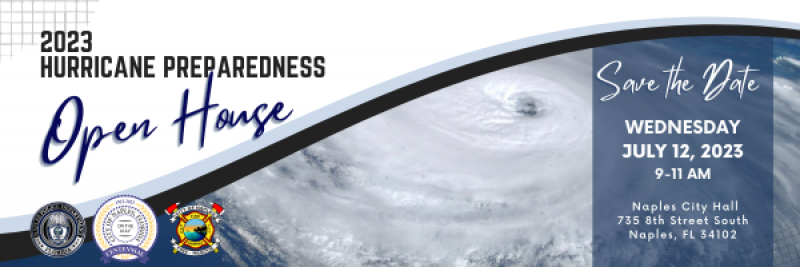from the City of Naples
Hurricane preparedness is crucial when living in coastal regions or areas prone to tropical storms. As hurricanes are powerful and unpredictable natural disasters, it is important to take proactive measures to protect lives and property. Firstly, staying informed is paramount. Regularly monitoring weather updates and heeding warnings from local authorities helps in early evacuation, if necessary. Creating an emergency plan with family members and discussing evacuation routes and meeting points ensures everyone’s safety. It is vital to stock up on essential supplies like non-perishable food, water, flashlights, batteries, medications, and a first aid kit. Safeguarding important documents and keeping them in a waterproof container is also recommended. Reinforcing homes with storm shutters or plywood and securing outdoor objects prevents them from becoming dangerous projectiles. Additionally, having a backup power source and maintaining vehicles in good condition are essential. Lastly, having adequate insurance coverage, including flood insurance, protects against potential damages. By taking these precautions, individuals and communities can enhance their resilience and minimize the risks associated with hurricanes, ensuring a safer and more prepared response in the face of such powerful storms.
Every home should have the following elements in place before a major storm develops:
Have an Evacuation Plan: Establish a “safety destination” (like a friend’s or relative’s house some distance away) and plan several different routes to get there, so you can drive around roadblocks or hazards. Practice your plan and become familiar with each route, so you will be better prepared. In case you are instructed to evacuate, know that our Hurricane Evacuation Zones are no longer referenced by storm category but are now named by Hurricane Surge Evacuation Zones A/B/C/D/E. *Please note that Hurricane Surge Evacuation Zones are different than Flood Zones. Click here to enter your address and view your Evacuation Zone. Remember, in case of evacuation, you may need to turn off your gas, water, and electricity before evacuating. Each member of the household should learn when and how to do this.
Prepare an Emergency Kit: During an emergency, it can take three (3) days or longer for government groups like FEMA or first responders to arrive. Remember, hope for 3 days, plan for 5! Assemble your Emergency Supply Kit; put everything in a special box and keep heat-sensitive items inside your house. Check your emergency equipment, like flashlights, generators, and storm shutters as well. Click link below for a full checklist of supplies.
Click HERE to learn How to Prepare your Pets for Disasters
Prepare your Family Communication Plan: During an emergency it is usually easier to make long distance calls, so choose an out-of-state relative to be your family’s “communication center”. Be sure that each member of your family knows the name and phone number for this person in case you are separated. By having everyone call one central person, it will be easier for you to check on each other and reunite after a disaster. Keep a copy of the plan with all family phone numbers in your emergency supply kit or another safe place where you can access it in the event of a disaster. Teach every family member when and how to dial 9-1-1 for emergency assistance.
Know the shelters, including pet-friendly, in the area: To use a Collier County pet-friendly shelter, you must be preregistered. Please call Emergency Management at (239) 252-3600 for further information. Click HERE for more information on Collier County shelters.
Sign up for Alerts, Warning, and Updates: Follow City of Naples, FL – Government, Naples Fire-Rescue Department, and Naples Police Department on social media and monitor local media outlets. Sign up for the CodeRed Alert System to receive emergency notifications from the City of Naples, or subscribe to our email list and/or SMS messaging system.








